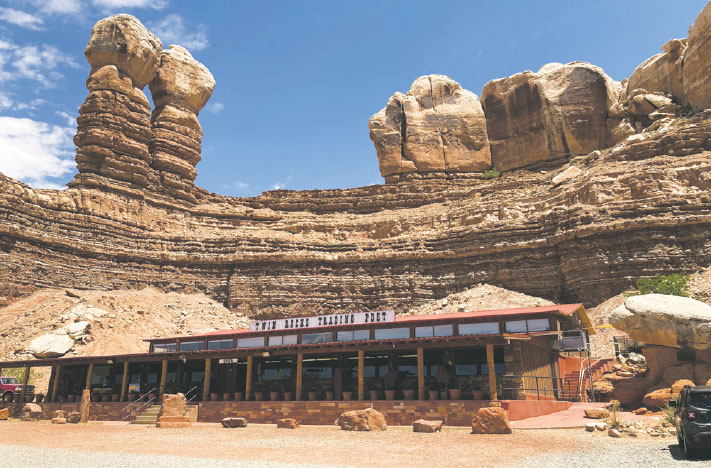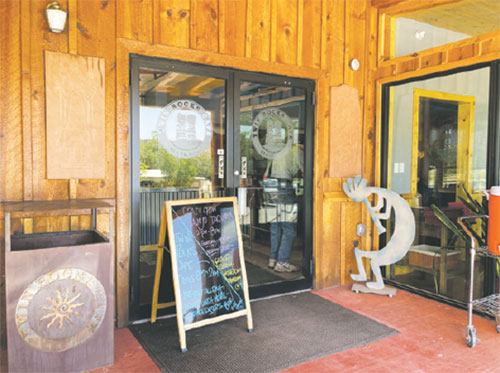
The Twin Rocks Café and Twin Rocks Trading Post are major stopping points for visitors to Bluff, Utah. Photo by Janneli F. Miller
Situated in the heart of Southeast Utah’s canyon country, the town of Bluff is a frequent stop for those on their way to and from Monument Valley, Bears Ears National Monument, Valley of the Gods, Goosenecks State Park, and Natural Bridges National Monument. Those wanting to float the San Juan River, visit the petroglyph panel at Sand Canyon, hike Comb Ridge, explore remote archaeological sites, or mosey through the Bluff Fort (which displays early pioneer life) are not disappointed.
Suitable for year-round enjoyment, the town hosts an increasingly popular arts festival – to be held Oct. 14-17 this year – and celebrates the winter solstice by burning a sculpture made by community members (See Four Corners Free Press, Dec. 2017)
Until recently, those interested in a meal had limited choices – usually steaks and fast food. Twin Rocks Café, at the east end of Bluff, just off Highway 191at 913 E. Navajo Twins Drive, was a fairly traditional café with a vast menu “gathered mostly through a big and corporate food source,” according to owner Steve Simpson, whose family founded the café in 1995.
Yet Simpson was interested in a “more community-invested” restaurant, and to that end, in July 2017 he hired professional chef Frances van der Stappen, who is currently head chef and general manager.
Van der Stappen had been receiving rave reviews as head chef at the Blue Belly Grill at the Zion Ponderosa Ranch Resort and Simpson was thrilled to have her join the Twin Rocks management team.
Simpson and Van der Stappen realized they wanted meals at Twin Rocks to be a “cultural experience – a little history lesson about our neck of the woods and an homage to our Navajo friends neighbors and co-workers,” noted van der Stappen.
To this end they started developing a new business plan, sourcing their staples from smaller, more local and privately owned suppliers, and orienting their menu around these foods.
Anyone who has a meal at Twin Rocks Café today will notice the creative menu offered. Guests can enjoy scrumptious and unusual meals, often featuring frybread, such as a Navajo Twin burger on frybread instead of a bun, eggs Benedict with a frybread base and green chili hollandaise, or a Navajo pizza with a frybread crust.
Of course, you can also get your frybread plain, or as a traditional Navajo taco.
The breakfast menu includes the usual fare, or you could get adventurous and try some blue corn pancakes or eggs Atsidi. Those who are vegan or gluten-free will not be disappointed – there are some vegan sweet-potato enchiladas that can’t be beat, and dairy-free menu options are also available.
“We want you to taste the sunshine, the health of the soil our beans come from, our abundance of fresh fruit, vegetables, chiles, pecans from New Mexico, pumpkin seeds and red-skinned trout,” Van der Stappen explained.
She and Simpson told the Free Press that they do their best to support local food producers. Their flour and blue cornmeal comes from Cortez Milling, they buy all their beef and pork locally, the coffee is fair-trade organic from Olympus Roasters in Salt Lake City, and their tortillas are made for them in Salt Lake City.
They take pride in the fact that their food does not have preservatives or additives.
Van der Stappen said they “never pass up an opportunity to hit a farmer’s market in Cortez.” All beans, honey and hot sauce comes from Dove Creek’s Adobe Milling.
“Adobe Milling makes the best dry soup mix on the market anywhere – we make that soup here regularly,” van der Stappen said.
Beverages include prickly-pear limeade, hibiscus sweet tea made in-house and Utah craft beer in cans.
When COVID-19 hit and the restaurant had to discontinue indoor offerings, they got creative and started what Simpson calls the “Crazy Crow Navajo Taqueria.” Customers can order custom tacos with a frybread base, and sit in the outdoor patio, which has a great view.

The Twin Rocks Café recently hired a new chef and revamped its menu. Photo by Janneli F. MIller
Twin Rocks also provides takeaway meals, with the to-go menu offering “boxes” for those who like to cook at home. A basic box includes a loaf of whole-grain bread, a dozen eggs, a half-pound of butter and a half-gallon of milk for $15. Other boxes available include breakfast, baking, burger and garden boxes.
In addition, Crazy Crow offers ready-made daily entrees, which change weekly and include meals such as a carne asada taco kit with guacamole, vegetarian macaroni and cheese, chicken mole enchiladas with beans and rice, or roast beef with garlic mashed potatoes.
Menus and prices are posted on the café Facebook page and customers can call in or email the café daily before noon to pick up on the same day between 4 and 5:30 p.m.
Van der Stappen noted that COVID-19 brought new opportunities to serve the community by providing free food boxes to community members in need.
“In 2020 we served over 70,000 meals on the Navajo Nation, and Bluff, from Monument Valley to Monticello,” she said.
Simpson and van der Stappen cleared out the space that used to house a gift shop in the café to make a workroom for the food-box production.
Local community members – including Native youth as well as café staff – delivered the boxes to central destination points on the reservation, where locals could come in to pick up their boxes.
Now that they are not using the space for the food boxes, they have set up a small market with fresh fruits and vegetables, local meats, and bakery and deli items, so that locals can stop in to get food products not available anywhere else in the area.
“We know that hunger is a reality in our area, COVID or not, and we will always do all we can to feed the members of our large local family in any way we can,” said van der Stappen.
The café has also become environmentally friendly. “We became aware of how much trash and waste we were creating and made a commitment to reduce our own footprint,” said van der Stappen.
Patrons will find a table with serve-yourself water where they can fill their own bottles or use the glasses provided. No plastic straws are used, and all to-go containers are recyclable, compostable or recycled, including compostable bamboo flatware. Fryer oil is recycled to avoid polluting the soil and groundwater, food scraps are fed to family pigs, and all cans are recycled as well.
Everyone who works at the café receives a living wage, and many of the staff are young Natives who are in college or saving money for their education. They receive scholarships and gifts, including cash bonuses for high-school employees with good grades in school. Café profits promote the agenda for health, hunger relief, environmental awareness and education.
The café is open from 8 to 3 p.m. daily, serving breakfast all day. Outdoor seating includes a number of tables on the front porch as well as a shaded patio beneath the Twin Rock formation that gives the café its name.
Next door to the café Simpson operates the Twin Rocks Trading Post, which offers a curated selection of Native American art, jewelry, rugs and ceramics. Visitors who stop in might be lucky enough to hear some of Simpson’s stories about the people and places that he and his family love.
It’s common to see license plates from all over the country in the parking lot, and the café provides an atmosphere where customers who are strangers often swap stories with each other about their recent travels, or grab their maps to tell people where to go next or what not to miss. The café is gaining a reputation as a destination in and of itself.

